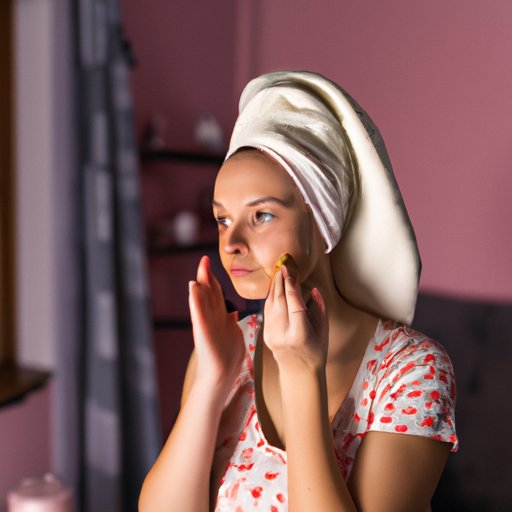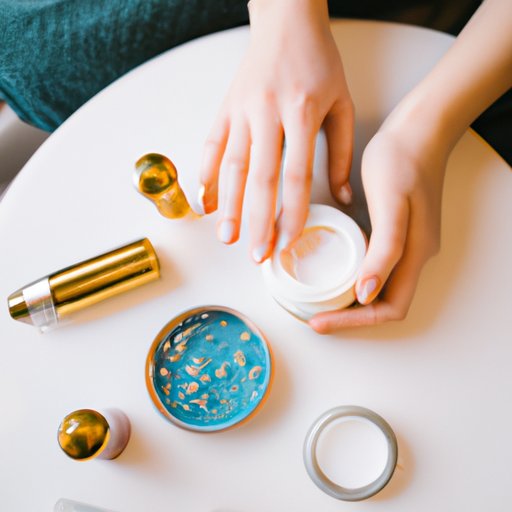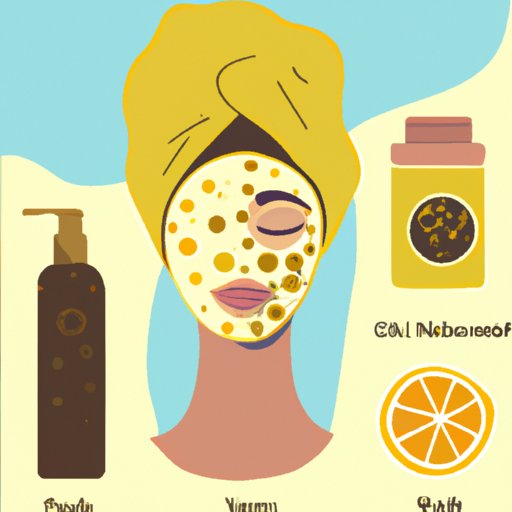Introduction
Taking care of your skin is essential for maintaining a healthy, glowing complexion. While there are many professional treatments available that can help improve the appearance of skin, taking care of your skin at home is an important part of any skin care regimen. In this article, we’ll discuss the benefits of skin care at home and provide tips for creating a successful skin care routine.
Overview of Skin Care at Home
Skin care at home involves more than just cleansing and moisturizing. It includes all the steps you take to keep your skin healthy and looking its best. This may include exfoliating, using natural ingredients, avoiding over-exfoliating, wearing sunscreen, and staying hydrated. Creating a skin care routine and following it consistently will help you achieve healthy, glowing skin.

Benefits of Skin Care at Home
There are many benefits to skin care at home, including:
- Saving money – Professional skin care treatments can be expensive, so doing it yourself at home can save you money.
- Customizing your routine – You can tailor your skin care routine to meet your individual needs.
- Improving skin health – Taking care of your skin at home can help improve its overall health and protect it from damage.

Creating a Skin Care Routine
Creating a skin care routine is the first step in taking care of your skin at home. Here are some tips for creating a successful skin care routine:
Cleansing
Cleansing your face twice a day is essential for keeping your skin clean and free of dirt and oil. Choose a gentle cleanser that won’t strip your skin of its natural oils. Avoid cleansers that contain harsh chemicals or fragrances as they can irritate your skin.
Exfoliating
Exfoliating your skin helps remove dead skin cells and can help unclog pores. When exfoliating, use a gentle scrub that won’t be too abrasive on your skin. Exfoliate no more than two to three times per week.
Moisturizing
Moisturizing your skin helps keep it soft and hydrated. Choose a moisturizer that is specifically formulated for your skin type. If you have dry skin, look for a cream or ointment-based moisturizer; if you have oily skin, choose a lightweight lotion or gel.
Using Natural Ingredients
In addition to commercial products, there are many natural ingredients that can be used to enhance your skin care routine. Here are some of the most popular natural ingredients for skin care:
Honey
Raw honey is a natural humectant, which means it helps draw moisture into your skin. It also has antibacterial and anti-inflammatory properties, making it great for treating acne. Honey can be applied directly to the skin or used in a homemade face mask.
Avocado
Avocado is rich in vitamins and fatty acids, making it an effective moisturizer. It can be mashed and applied directly to the skin or blended with other natural ingredients to create a nourishing face mask.
Coconut Oil
Coconut oil is a natural emollient and is great for dry, irritated skin. It can be used as a body or face moisturizer or added to a homemade body scrub.
Avoiding Over-Exfoliating
Frequency of Exfoliation
While exfoliating your skin is important for keeping it healthy, it’s important not to overdo it. Too much exfoliation can cause irritation and dryness. Stick to exfoliating no more than two to three times per week.
Dryness and Irritation
If your skin feels dry or irritated after exfoliating, it’s a sign that you are overdoing it. Take a break from exfoliating for a few days and focus on moisturizing your skin. Then, when you start exfoliating again, make sure to use a gentle scrub.
Wearing Sunscreen
Broad-Spectrum Protection
Protecting your skin from the sun’s harmful UV rays is essential for maintaining healthy skin. Choose a sunscreen that offers broad-spectrum protection against both UVA and UVB rays.
SPF 30 or Higher
Choose a sunscreen with an SPF of 30 or higher. This will help ensure that your skin is protected from sunburn and long-term damage caused by the sun’s rays.
Staying Hydrated
Drinking Water
Drinking enough water is important for overall health, but it’s also essential for healthy skin. Make sure to drink at least eight glasses of water per day to keep your skin hydrated and looking its best.
Skin Health Benefits
Staying hydrated can also help improve the appearance of your skin. It can help reduce the appearance of wrinkles and give your skin a healthy glow.
Conclusion
Taking care of your skin at home is an important part of any skin care regimen. By creating a skin care routine and using natural ingredients, you can achieve healthy, glowing skin. Additionally, remember to wear sunscreen and stay hydrated to protect your skin from the sun’s damaging rays. With these tips, you can enjoy a healthy, glowing complexion.
Summary of Skin Care Tips
- Create a skin care routine and follow it consistently.
- Use natural ingredients such as honey, avocado, and coconut oil.
- Avoid over-exfoliating and choose a gentle scrub.
- Wear sunscreen with an SPF of 30 or higher.
- Stay hydrated by drinking at least eight glasses of water per day.
Final Thoughts
Taking care of your skin at home is essential for achieving healthy, glowing skin. By following these tips, you can enjoy a beautiful complexion without having to spend a fortune on professional treatments.
(Note: Is this article not meeting your expectations? Do you have knowledge or insights to share? Unlock new opportunities and expand your reach by joining our authors team. Click Registration to join us and share your expertise with our readers.)
